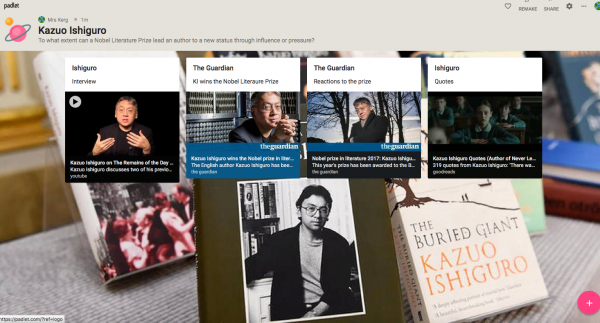Kazuo Ishiguro, Nobel Literature Prize in October 2017
By Bénédicte KERG on 01 November 2017, 20:09 - Permalink
Kazuo Ishiguro was born in Nagasaki, Japan, on 8 November 1954. He came to Britain in 1960 when his father began research at the National Institute of Oceanography, and was educated at a grammar school for boys in Surrey.
Afterwards he worked as a grouse-beater for the Queen Mother at Balmoral before enrolling at the University of Kent, Canterbury, where he read English and Philosophy. He was also employed as a community worker in Glasgow (1976), and after graduating worked as a residential social worker in London.
He studied Creative Writing at the University of East Anglia, a member of the postgraduate course run by Malcolm Bradbury, where he met Angela Carter, who became an early mentor. He has been writing full-time since 1982. In 1983, shortly after the publication of his first novel, Kazuo Ishiguro was nominated by Granta magazine as one of the 20 'Best of Young British Writers'. He was also included in the same promotion when it was repeated in 1993.
In 1981 three of his short stories were published in Introductions 7: Stories by New Writers. His first novel, A Pale View of Hills (1982), narrated by a Japanese widow living in England, draws on the destruction and rehabilitation of Nagasaki. It was awarded the Winifred Holtby Memorial Prize. It was followed by An Artist of the Floating World (1986), which explores Japanese national attitudes to the Second World War through the story of former artist Masuji Ono, haunted by his military past. It won the Whitbread Book of the Year award and was shortlisted for the Booker Prize for Fiction. Ishiguro's third novel, The Remains of the Day (1989), is set in post-war England, and tells the story of an elderly English butler confronting disillusionment as he recalls a life spent in service, memories viewed against a backdrop of war and the rise of Fascism. It was awarded the Booker Prize for Fiction, and was subsequently made into an award-winning film starring Anthony Hopkins and Emma Thompson. His next novel, The Unconsoled (1995), a formally inventive narrative in which a concert pianist struggles to fulfil a schedule of rehearsals and performances in an unnamed European city, was awarded the Cheltenham Prize in 1995.Kazuo Ishiguro's fifth novel, When We Were Orphans (2000), is set in Shanghai in the early part of the twentieth century, and is narrated by a private detective investigating his parents' disappearance in the city some 20 years earlier. It was shortlisted for both the Whitbread Novel Award and the Booker Prize for Fiction. His sixth novel is Never Let Me Go (2005) and he collaborated with George Toles and Guy Maddin on the screenplay for The Saddest Music in the World, a melodrama set in the 1930s, starring Isabella Rossellini. In 2009, his first short story collection, Noctures: Five Stories of Music and Nightfall, was published, and shortlisted for the 2010 James Tait Back Memorial Prize (for fiction). His latest novel The Buried Giant was published in 2015.
He has also written two original screenplays for Channel 4 Television, A Profile of Arthur J. Mason, broadcast in 1984, and The Gourmet, broadcast in 1986. He was awarded the OBE in 1995 for services to literature and is a Fellow of the Royal Society of Literature. He was awarded the Chevalier de l'Ordre des Arts et des Lettres by the French government in 1998. His work has been translated into over 30 languages. In 2017 he won the Nobel Prize for Literature.
Visit the padlet for ACTIVITIES
